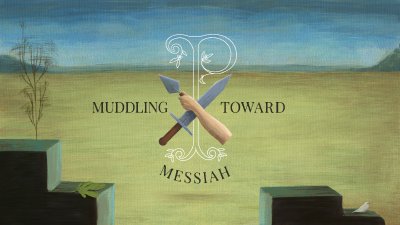Hungry Is Better than Sorry
This weekend we celebrate Palm Sunday, a tradition tied to the triumphal entry of Christ into Jerusalem and the beginning of his Passion. Jesus is welcomed through the gates of Zion as their long-awaited Savior-king, but by the end of the week he’s being executed as a criminal outside its walls. These are, by the way, the same city walls (massive improvements notwithstanding) that we just saw Nehemiah and company rebuild over just 52 days despite “decay from within and from without.”
Who could have imagined that the city built (at great cost!) to be a dwelling place for God and man would ultimately reject the perfect God-man? After decades of celebrating this series of events, I am still amazed by the reversal. Which is weird, because it’s not like my heart isn’t just as fickle. I’m like Paul in Romans 7: I do what I don’t want to do, and I don’t do what I do want to do. (Who will deliver me from this body of death!?) Scripture is a faithful mirror to the soul.
It reminds me of the young man who tried to order his steak well done at a fancy-schmancy Manhattan restaurant. When the waiter refused to fulfill that request, the man protested, “But that’s how I like it!” To which the server deadpanned, “With all due respect, sir, you don’t know what you like.” It really does come down to desires, and how our crooked affections must be trained to love the lovely.
In our passage this week, we find Ezra and Nehemiah tag-teaming the remnant, lovingly reminding them that they suffer from something far worse and yet somehow also mercifully better than guilt. Humanity’s great shame is that we have a tragically unsophisticated palate! We settle for and even learn to crave things that simply do not satisfy the hunger with which we were created, which was intended to drive us to the One for whom we were made.
Their surprising solution? Less weeping; more feasting.
I can’t wait to show you!
- josh

Hungry Is Better Than Sorry
April 10, 2022 • Rev. Joshua Smith • Nehemiah 8:1–12
Holding, Folding, and Going All In
January 30, 2022 • Rev. James M. Holland • Ezra 4:24—5:4
Years ago, Kenny Rogers had a song called “The Gambler”. It was about a young man riding on a train, bound for nowhere, and meeting up with a gambler. The gambler decided after looking at the young man that he needed some advice. He basically told him, every hand is a winner and every hand is a loser, so you have to know when you hold, when to fold, or when to walk away. Israel found themselves in a situation where they were looking at the hand they were dealt and decided to fold and walk away. They read their hand through the eyes of the opposition they faced and the odds against them looked bad, so they stopped working on the temple. They started with great zeal but, when local pressure and political pressure mounted, they folded. For fifteen years, they folded. We learn, however, that it wasn’t just political pressure; it was just not a priority. Finally, Haggai the prophet takes them to task for neglecting the temple and urges them to “go all in.” In fact, he suggests that the reason they work hard but have no satisfaction is because they have relegated God to the side. This is the subject we’ll consider this Sunday. What does it look like to be “all in”? How do we sustain passion? How do we stay committed over the long haul? Tough questions in a day of infinite browsing and little commitments. But it should be eye-opening and will suggest a way towards real freedom. I hope to see you Sunday! Remember, if you are new to St. Patrick and would like to know more about our vision, values, mission and ministries, join me at 9:15am in the Adult Sunday School area for our Inquirers’ Class. Just make it to the coffee machines, and we will find you and get you in the right classroom. Blessings, Jim
The Shape of Kingdom Story
April 3, 2022 • Rev. James M. Holland • Nehemiah 4—7
The Shape of Kingdom Story Every year in the early spring, anger starts to build. I look out over my garden and it is fallow; yet weeds are starting to sprout everywhere. I survey my yard and the brown dormant grass is sprinkled with spring weeds. Teri’s beds are a mess, as well. For months this has been okay, but now it is not okay. My vineyard is also a depressing sight—it looks like a bee hive of branches, in no particular order. So, I am ticked. For this to be beautiful, something has to be roused from lethargy; priorities will have to shift—what I want is on the other side of hard! I belong to this place—that is why I feel anger. For it to bloom, I will have to push back the weeds that threaten to overrun everything. Anger is not enough. Anger just gets me going. The real work is in inventorying the needs for weed control in my yard, followed by trips to TSS and Russell’s Farm Supply. Cleaning out my sprayer, mulching leaves, picking up sticks. I have just a few Saturdays to get this done and other good things will have to wait, while hours upon hours are spent in back-breaking labor. Everything is out to wreck what I am trying to achieve—weeds, moles, raccoons, deer, bugs beyond reckoning, and weather. Not to mention, my own laziness and desire to do other things. Trouble without! Trouble within! Last week we saw Nehemiah set his people’s hair on fire. With the exception of the Tekoian nobles, everyone showed up to do work they were not good at, sacrificing personal glory for God’s glory. They were angry for God’s glory and so they came to work. This Sunday we see it takes much more than anger to get things done. Without anger, I suppose nothing worthwhile gets started, but what it takes to keep going is more like virtue. All kingdom building has a similar shape. There will be trouble without and trouble within, and it is so discouraging you want to quit. And yet, real kingdom-building perseveres. That is the part of the story we enter into this Sunday. I hope you will join us. We also have a bunch of new family members to introduce you to as well. Speaking of perseverance, I don’t know about you but I am ready for the dog days of Lent to give way to resurrection. It is coming––hang on! Blessings, Jim
Remember Me For Good
May 1, 2022 • Rev. Joshua Smith • Nehemiah 13:1–14
Remember Me for Good I ran into an acquaintance today who asked what I plan to preach this summer. When I told him we’re going to be exploring the Messianic Psalms, he lit up. “I’ve been asking this question and no one knows: why do the Jews want a Messiah when they don’t believe in Hell?” I was a bit taken aback at first, because, while I do earnestly believe that salvation from Hell is a primary eternal benefit, it’s been a long time since I assumed that Jesus’ only earthly objective was securing a heavenly afterlife. As a Cordovan, I grew up in the shadow of Bellevue Baptist Church, whose be-sainted Dr. Adrian Rogers famously said, “Some people just want to make the world a better place to go to hell from.” He was rightly pushing back against the idea of a social agenda without respect to the eternal state of souls before God. Indeed, “for what does it profit a man to gain the whole world and forfeit his soul?” And yet, Jesus also teaches us to pray that God’s “will be done on Earth as it is in Heaven,” and to reduce his insistence on love of neighbor to perpetual altar calls would be a tragic violation of the text. So, what is the relationship between eternal salvation and social reform? As we finally wrap up our semester-long series, Nehemiah seems to be wrestling with this tension, too. He doesn’t have our separation-of-church-and-state baggage, which, as we will see, really muddies the waters for him when it comes to the use of force. (Ezra pulls out his own hair; Nehemiah will pull out yours!) Still, his position as governor of a theocratic region gives him perhaps a better vantage point from which to explore the relationship between eternity and the here-and-now. Does he get it right? No. But, as it turns out, an anticlimax at the end of the Old Testament does exactly what it’s designed to do! And "the Lord shows compassion to those who fear him. For he knows our frame; he remembers that we are dust." So, join us for one more week of Muddling Toward Messiah before we turn our attention to a summer of Psalms that speak with much more clarity and comfort about the God-Man, Lord and Savior of Heaven and Earth. - j





